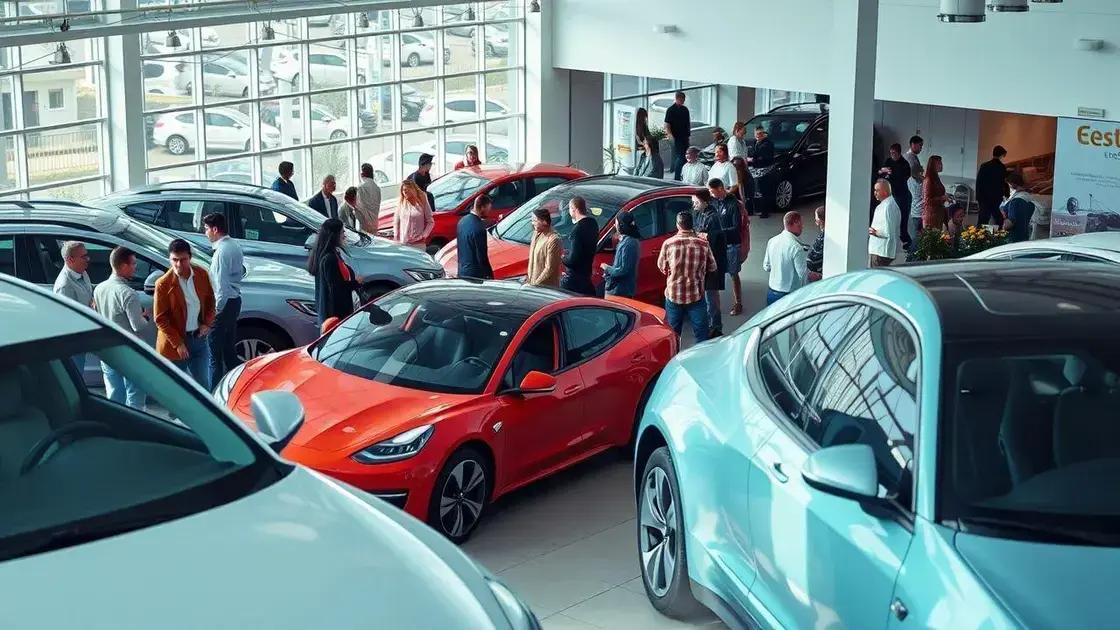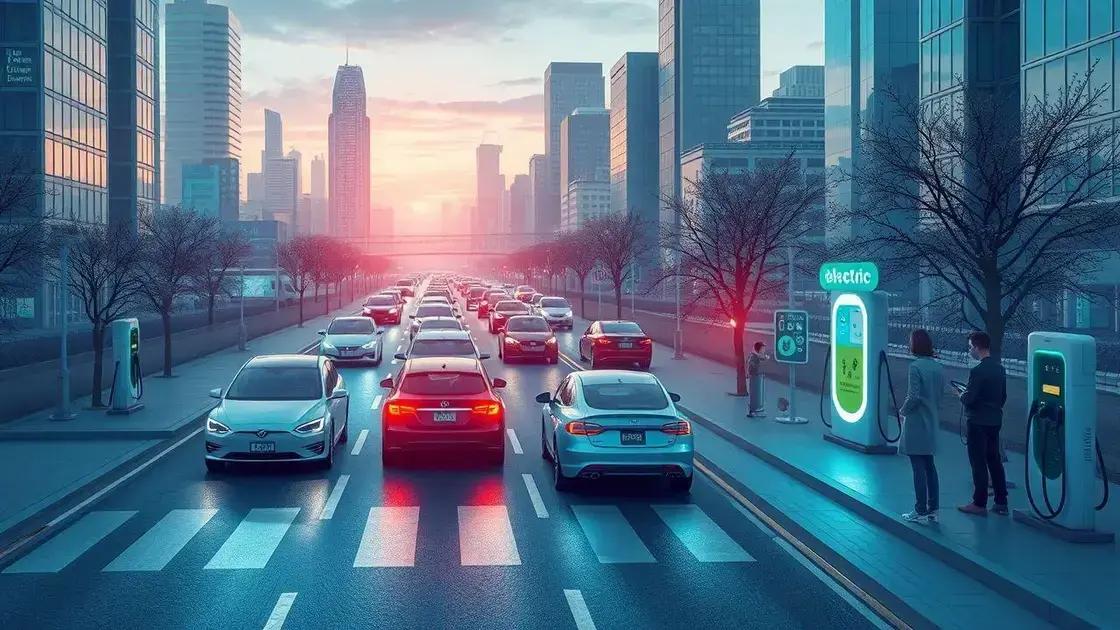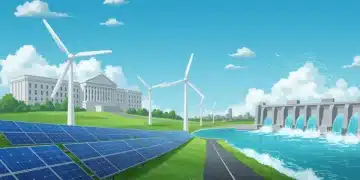Electric vehicle news trends shaping the future

Electric vehicle adoption is rapidly increasing as government regulations, financial incentives, and consumer demand for sustainable options drive change in the automotive industry and promote a cleaner future.
Electric vehicle news trends are rapidly changing the landscape of transportation. With innovations emerging daily, it’s fascinating to see how these developments influence our daily lives and the environment. Are you curious about what’s happening in this dynamic field?
Recent advancements in electric vehicle technology
The world of electric vehicle technology is advancing at an incredible pace. As we look at recent developments, it’s clear that innovation is driving change and shaping our future. Breaking barriers in battery performance and charging solutions, manufacturers are focused on creating sustainable and efficient vehicles.
New Battery Technologies
One major advancement is in battery technology. Companies are investing heavily in research to improve battery life and reduce charging times. These improvements will help make electric vehicles more appealing to consumers.
- Solid-state batteries promise greater energy density.
- Fast-charging options reduce downtime for users.
- Recycling of old batteries is becoming more efficient.
- Cost reductions in battery生产 lead to cheaper vehicles.
With these innovations, the future of electric vehicles looks bright. Additionally, progress in software is making vehicles smarter. Advanced algorithms are enhancing driver-assistance features and enabling over-the-air updates, providing a more convenient driving experience.
Enhanced Charging Infrastructure
As electric vehicles gain popularity, charging infrastructure is also evolving. Cities around the world are expanding their charging networks. More charging stations mean that users have access to power when they need it.
- Fast chargers can replenish batteries in under 30 minutes.
- Wireless charging options are under development.
- Home charging solutions provide convenient overnight charging.
- Solar-powered charging stations support sustainability.
These enhancements in charging technology complement the advancements in vehicles and play a vital role in increasing adoption rates. Moreover, new regulations are encouraging automakers to invest in electric vehicle technology. Governments worldwide are setting emissions targets and providing incentives for the purchase of electric vehicles.
In summary, the landscape of electric vehicle technology is rapidly developing. With improvements in batteries and charging solutions leading the way, the future holds great promise for sustainable transportation alternatives. The continuous focus on technology not only benefits the environment but also enhances the overall driving experience.
Market trends in electric vehicle sales

Understanding market trends in electric vehicle sales is crucial for both consumers and manufacturers. As more people shift towards eco-friendly transportation, the landscape of the automotive industry is rapidly changing. These trends can provide valuable insights into what the future may hold.
Growth in Sales
Recent data shows a significant increase in electric vehicle sales across various regions. This growth is driven by a combination of factors, including technological advancements, government incentives, and changing consumer preferences.
- Increased awareness of environmental issues is driving demand.
- Tax credits and rebates make electric vehicles more affordable.
- Improved range and performance attract new buyers.
- More automakers are entering the electric vehicle market.
As these factors converge, the market continues to expand at an impressive rate. Electric vehicle sales are expected to double over the next few years, particularly in urban areas where charging infrastructure is growing rapidly.
Consumer Preferences
When consumers consider purchasing an electric vehicle, several factors influence their decisions. Comfort, performance, and brand reputation play key roles in the selection process. Additionally, many buyers now prioritize sustainability, which influences their vehicle choice.
- Shoppers often look for energy efficiency and low operating costs.
- Features like autonomous driving technology are gaining popularity.
- Stylish designs and modern interiors are attractive to buyers.
- Access to convenient charging options is essential.
The electric vehicle market is not only growing due to new models but also because of changing perceptions regarding electric vehicles. Faced with rising fossil fuel prices and climate change, more consumers are opting for electric options.
The role of social media and marketing in shaping consumer opinions cannot be underestimated. Engaging campaigns can effectively highlight the benefits of electric vehicles, leading to increased sales and brand loyalty.
Impact of government regulations on electric vehicles
The impact of government regulations on electric vehicles plays a crucial role in shaping the automotive landscape. As concerns about climate change grow, authorities around the world are implementing rules to promote electric vehicle adoption. These regulations not only aim to reduce emissions but also encourage investment in clean technologies.
Incentives for Consumers
Many governments offer financial incentives to consumers who purchase electric vehicles. These incentives make owning an electric vehicle more affordable. Tax breaks, rebates, and grants can significantly decrease the overall cost of an electric vehicle.
- Tax credits can offset the initial purchase price.
- Cash rebates encourage buyers to switch to electric.
- Free charging station installation reduces infrastructure costs.
- Loyalty programs reward repeat customers in the electric vehicle sector.
In addition to these incentives, governments are also focusing on building charging infrastructure. A widespread network of charging stations is necessary to support the growing number of electric vehicles. With more charging options, consumers feel more confident about switching from gas to electric.
Emissions Standards
Governments are enforcing stricter emissions standards for vehicles. These regulations push automakers to produce cleaner vehicles. As a result, many manufacturers are investing heavily in electric technology to meet these new requirements.
- Lower emissions targets are set for all new vehicles.
- Increased penalties for failing to meet emissions standards.
- Mandatory electric vehicle production quotas for automakers.
- Support for research and development of sustainable practices.
The push for lower emissions is not just a short-term goal; it is essential for achieving long-term sustainability. By encouraging electric vehicle use, governments can significantly lower greenhouse gas emissions, leading to cleaner air and a healthier environment.
Furthermore, future regulations are expected to promote even more advancements in electric vehicles, such as improvements in battery technology and energy efficiency. It is clear that as policies evolve, they will continue to influence the direction of the electric vehicle market.
Future predictions for electric vehicle adoption

The future predictions for electric vehicle adoption indicate that the shift towards electric mobility is set to accelerate in the coming years. With advancements in technology and increasing consumer awareness, electric vehicles are likely to become the preferred choice for many drivers.
Market Growth Projections
Industry experts anticipate rapid growth in the electric vehicle market. By 2030, it is predicted that electric vehicles could account for a significant percentage of total vehicle sales.
- Various reports suggest that 25–30% of all new car sales may be electric by 2030.
- In urban areas, the adoption rate might be even higher due to stricter emissions regulations.
- Advancements in battery technology will support longer ranges and shorter charging times.
- New models from manufacturers will increase the variety available to consumers.
These growth projections reflect a growing acceptance of electric vehicles as viable alternatives to traditional vehicles. As features and performance improve, more buyers will consider switching.
Consumer Attitudes
Changing consumer attitudes also play a vital role in the future of electric vehicle adoption. Many people are more conscious of their environmental impact and are seeking sustainable options.
- Awareness campaigns will continue to educate consumers about the benefits of electric vehicles.
- Word of mouth from satisfied electric vehicle owners will influence potential buyers.
- The availability of electric vehicle models across all price ranges will appeal to a broader audience.
- Flexibility in charging options will further ease concerns about range anxiety.
As more people experience the advantages of electric vehicles firsthand, it’s likely that enthusiasm for electric mobility will grow. Innovative marketing strategies will also help to engage a diverse audience.
Government policies aimed at promoting electric vehicle adoption will drive future trends. Strong incentives, along with commitments to expand charging infrastructure, will support this transition.
FAQ – Questions about Electric Vehicle Adoption
What are the main benefits of switching to electric vehicles?
Switching to electric vehicles helps reduce greenhouse gas emissions, lowers fuel costs, and often comes with government incentives.
How is the charging infrastructure improving for electric vehicles?
Governments and private companies are expanding charging networks, making it easier to find charging stations in urban areas and along highways.
What role do government regulations play in electric vehicle adoption?
Government regulations encourage manufacturers to produce more electric vehicles and often provide financial incentives for consumers to buy them.
What can consumers expect in the future regarding electric vehicle options?
Consumers can expect a wider variety of models, improved battery technologies, and more affordable pricing as electric vehicle adoption increases.





